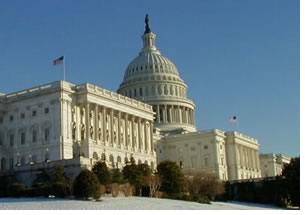

2004 Promises Crowded Federal Agenda
 A
partisan Congress facing election-year pressures reconvened last week
to a packed agenda. Lawmakers are poised for action on architecture-related
issues that include transportation funding, energy conservation, corporate
taxes, and public-private competition.
A
partisan Congress facing election-year pressures reconvened last week
to a packed agenda. Lawmakers are poised for action on architecture-related
issues that include transportation funding, energy conservation, corporate
taxes, and public-private competition.
Transportation: The Transportation Equity Act for the 21st Century (TEA-21) expired on September 20, 2003. Unable to reach agreement over the amount and funding source for the bill, Congress approved a six-month extension, which ends February 29. Currently, the House of Representatives is advocating funding of $375 billion, the Senate is insisting on $311 billion, and the White House is calling for only $247 billion.
Historical Preservation, Section 4 (f): A provision of the Department of Transportation Act of 1966 that gives protection to historic properties at the site of projects funded or approved by Transportation Department agencies is in danger of being weakened in talks over TEA-21. In particular, Sen. George Voinovich (R-Ohio) indicated that he will offer an amendment to the new transportation funding bill (S.1072) that would modify Section 4 (f) to ease restrictions on transportation projects when historic sites are involved. For more information contact the National Trust for Historic Preservation. The AIA also urges members to contact their senators to express opposition to the weakening of Section 4 (f).
Energy: The comprehensive energy bill that failed to pass in the Senate last year included several AIA-supported provisions, such as tax credits for energy efficiency in homes and commercial structures, and several energy-conservation research incentives. Republicans are expected to make another push for passage in 2004.
Corporate Taxes: Lawmakers included language in The American Jobs Creation Act of 2003 to allow a 3 percent corporate-rate reduction for certain firms that conduct “construction, engineering, and/or architectural services performed within the United States for construction projects in the United States.” The AIA also advocated for the inclusion of a leasehold and restaurant improvement provision that would reduce the depreciation schedule from 39 to 15 years over the next two years. These tax issues are expected to be resolved in 2004.
A-76: Public Private Competition: In 2003, the federal Office of Management and Budget (OMB) released the revised version of Circular A-76, which outlines rules for competitive sourcing in the federal government and makes obsolete many of the past practices relating to public-private competition for government jobs.
Under the new guidelines, an estimated 425,000 federal jobs would be up for competition between the public and private sectors. However, some lawmakers have tried to slow or eliminate such competitions by offering amendments to authorization bills. The White House has been successful in turning back some of these amendments by threatening a veto. On December 23, 2003, the OMB asked all federal agencies to submit their long-term job competition plans through 2008. A more detailed plan is expected later from the White House.
Copyright 2004 The American Institute of Architects.
All rights reserved. Home Page ![]()
![]()
 |
||
| The AIA will be engaged actively in these issues to ensure that the architecture profession’s interests are protected. For more information or to comment, contact Federal Affairs Senior Director Daniel S. Wilson, 202-626-7384, or Federal Issues Analyst Presley R. Jones, 202-626-7403. For more government affairs news, subscribe to the AIA Angle. It’s free!
|
||